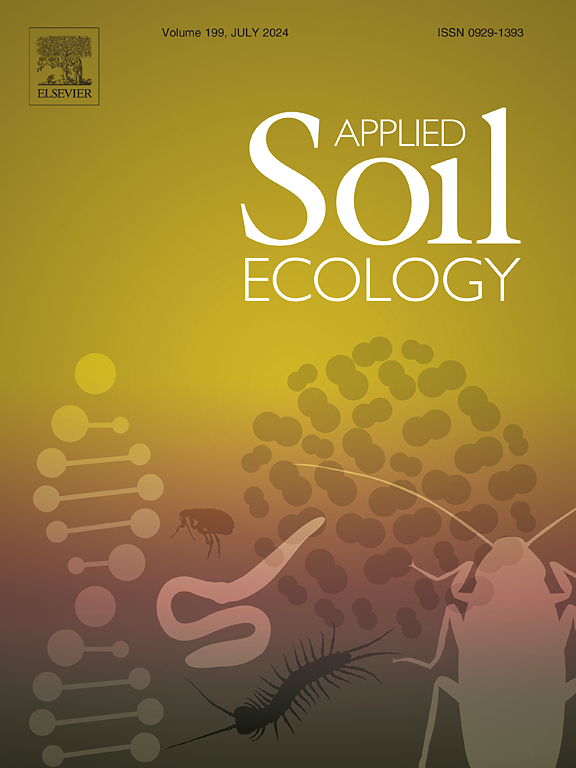Organic amendments alter urban soil microbiomes and improve crop quality
IF 4.8
2区 农林科学
Q1 SOIL SCIENCE
引用次数: 0
Abstract
Urban agriculture has the potential to support the health and sustainability of urban communities across the globe. Nonetheless, little information is available on urban soil management and strategies for supporting different aspects of soil health in the context of urban farming. We performed a greenhouse trial to investigate the effects of a variety of organic amendments derived from local municipal waste products on the soil microbiome as well as tomato (Solanum lycopersicum, L.) productivity and quality in an urban agricultural soil from the San Francisco Bay Area (USA). We hypothesized that organic soil amendments could enhance microbial abundance, activity, and diversity in urban soils, however the specific effects may be dependent on the physicochemical and biological properties of the amendments used. Further, we hypothesized these shifts in soil biology could correspond to changes in crop productivity and quality. Liquid food waste hydrolysate and mixed herbivore waste compost increased microbial abundance in the soil compared to mineral fertilizer, likely due to increases in available carbon and nutrients. Analysis of potential extracellular enzyme activity showed solid amendments could enhance microbial carbon cycling in the soil as a result of increases in organic matter. 16S rRNA sequencing indicated that solid amendments altered the composition of the soil microbiome, including the relative abundances of dominant soil bacterial phyla. Mineral-fertilized tomato plants generally had higher productivity and yields compared to plants grown with amendments, but plants treated with the hydrolysate and mixed herbivore waste compost had enhanced fruit soluble sugar content (i.e., °Brix). This study documents significant effects of diverse amendments derived from local municipal waste products on microbiomes found in urban soils. Further, the data suggests linkages between soil management, soil biology, and crop taste, which should be explored in future research.
有机添加剂改变城市土壤微生物群落,提高作物质量
城市农业具有支持全球城市社区健康和可持续发展的潜力。然而,关于城市土壤管理和支持城市农业不同方面土壤健康的策略的信息却很少。我们在旧金山湾区(美国)的城市农业土壤中进行了一项温室试验,研究从当地城市废物中提取的各种有机添加剂对土壤微生物组以及番茄(Solanum lycopersicum, L.)产量和质量的影响。我们假设,有机土壤改良剂可以提高城市土壤中微生物的丰度、活性和多样性,但具体效果可能取决于所用改良剂的物理化学和生物特性。此外,我们还假设土壤生物学的这些变化可能与作物产量和质量的变化相对应。与矿物肥料相比,液态食物垃圾水解物和混合草食动物垃圾堆肥增加了土壤中微生物的丰度,这可能是由于可用碳和养分的增加。对潜在胞外酶活性的分析表明,由于有机物的增加,固体添加剂可促进土壤中微生物的碳循环。16S rRNA 测序表明,固体添加剂改变了土壤微生物组的组成,包括主要土壤细菌门的相对丰度。与施用添加剂的植物相比,施用矿物质肥料的番茄植株一般具有更高的生产力和产量,但使用水解物和混合食草动物废物堆肥处理的植株果实可溶性糖含量(即 °Brix)更高。这项研究记录了从当地城市废弃物中提取的各种添加剂对城市土壤中微生物群的重大影响。此外,这些数据还表明土壤管理、土壤生物学和作物口味之间存在联系,应在今后的研究中加以探讨。
本文章由计算机程序翻译,如有差异,请以英文原文为准。
求助全文
约1分钟内获得全文
求助全文
来源期刊

Applied Soil Ecology
农林科学-土壤科学
CiteScore
9.70
自引率
4.20%
发文量
363
审稿时长
5.3 months
期刊介绍:
Applied Soil Ecology addresses the role of soil organisms and their interactions in relation to: sustainability and productivity, nutrient cycling and other soil processes, the maintenance of soil functions, the impact of human activities on soil ecosystems and bio(techno)logical control of soil-inhabiting pests, diseases and weeds.
 求助内容:
求助内容: 应助结果提醒方式:
应助结果提醒方式:


